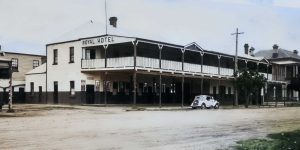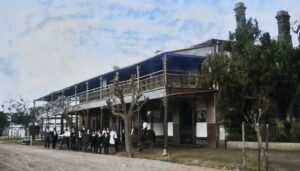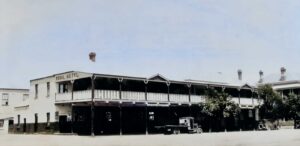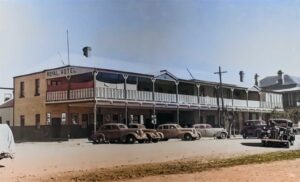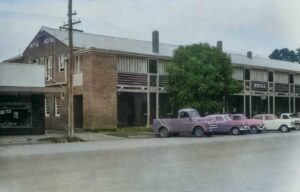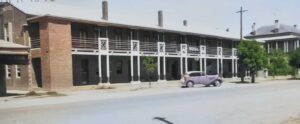The Port of Bourke Hotel stands on the site of one of Bourke’s very first hotels, The Old Fort Hotel, and has been in operation almost continually since the first licence was granted by the local police magistrate on 11 November 1862.
The original hotel was built by skilled stockman, pastoralist and later politician and newspaper proprietor John Edward Kelly. Kelly was born in the Hunter and claimed that his father, grandfather and grandmother were also born in Australia. He began working on properties at 14, and by 17 years of age, Kelly was in command of a station on the Namoi. At 18 he joined Vincent Dowling in establishing himself at Fort Bourke Station, around 1859.
Kelly and Dowling ventured out into the country west of the Darling, then unknown by Europeans, and it is said Kelly was the first European to set eyes on the Paroo River, along which he took up several runs.
Selling out his pastoral holdings in 1861, Kelly set about forming a township in conjunction with Dowling, storekeeper Joseph Becker and William Sly.
Impatient to get building Kelly, Sly and Becker began erecting their relative premises before the official land sale in September 1862.
A correspondent of the Bathurst Free Press tells us that Sly’s hotel was well underway by June 1862, and that Kelly had a plant preparing building materials in the bush for his inn.
When the land sale was advertised however, it was discovered that Kelly’s hotel was on land earmarked for the future town hospital. Becker’s store too had been built on public land.
In October, the same correspondent tells us that Sly was close to finishing his hotel which was planned to open on 1 November, while Kelly’s house was “also considerably advanced” and an application was made to open on 1 December.
The licensing meeting was held on November 11 with both hotels granted a licence although Kelly’s was only by majority, not unanimous. The Police Magistrate objected on the grounds that the building being erected was on land reserved for public buildings, and therefore the applicant must be considered a trespasser!
The Old Fort Hotel opened to a grateful public on 1 December 1862, two-and-a-half weeks after Sly’s Bourke Hotel.
Just a few months later the local correspondent reported that down-country publicans would be surprised to know the amount of money being handed over the bar by local shepherds and shearers.
“It is, no doubt, to be regretted that money so hardly earned, should be so easily parted with,” he writes, “but such are the habits of these classes, with their long abstinence from drink, that when they receive their cheques (perhaps fifty or one hundred pounds, or more), they never stop till they get to a public-house, lodge their cheques in the landlord’s hands, and in a few weeks at most ‘knock it down,’ and with empty pockets and impaired health seek another flock, and wait for the next shearing to repeat the same course.
“The reasons given for opening these houses are that men will spend their money, however far they may have to travel— so we save them trouble, and keep the money in the district.“
Bourke’s First Publican
JOHN EDWARD KELLY
He was born probably in 1839, near Morpeth, the son of a Hunter River farmer. At the age of 14 he was a ration carrier and storekeeper on a station on the Bogan and at 17 was, for a time, in full charge of a station on the Namoi. At 18 he worked as Vincent J. Dowling’s head-stockman after he occupied land around Fort Bourke. He accompanied Dowling on his exploration through the Cuttaburra-Irrara Creek country to the north-west and claimed to be the first white man to see the Paroo River. He took up a number of runs on the Paroo, and his descendants say that he named Yantabulla. The Bogan River Company already had stock grazing along the Warrego at this time.
Later he sold his Paroo properties and went to the newly born township of Bourke. Here he carried on several businesses, including the ‘Old Fort’ Hotel, later the ‘Royal’, and it is said that the hotel was the first real building to be commenced there. His son Edmond Bourke Kelly is said to have been the first white boy born in Bourke itself (on 14 February 1965) and was the first baby delivered by a doctor in Bourke.
He played a leading part in the arrest of James Stewart, who on 8 March 1964 was committed to Bathurst on a charge of murder. He had ‘Pirillie’ Station for some time, and at least one of his children (a daughter, Margaret Darling Kelly, 1881) was born there (later becoming Mrs. Perrottet).
In 1868 he sold out his businesses and bought other stations when prices were low. One of these was ‘Myall Mundie’, Trangie, where he erected a fine residence and was a pioneer of sub-artesian irrigation. He left the Bourke district in 1881. He became M.L.A. for the Bogan, and was in the official party on the first train to Bourke in 1885.
He had large interests in mines at Molong and Peak Hill, was proprietor and publisher of Stockwhip newspaper, and the first Mayor of Peak Hill. He died at Peak Hill in November 1896, at the age of 57, of cancer of the throat.
Today

Port of Bourke Hotel
The grand old lady of Bourke, the Port of Bourke (originally called ‘the Royal’) is one of the finest buildings in town, and also one of the finest pubs. A large, double-storey building with deep verandahs on both levels, the pub faces Mitchell Street and is close to the popular wharf precinct, and the newly paved and landscaped park areas around the river.
The Past

The Pubs & Breweries of Bourke
From its earliest days Bourke has always had a reputation as a drinking town and it’s no wonder as it was, in fact, founded by publicans!


